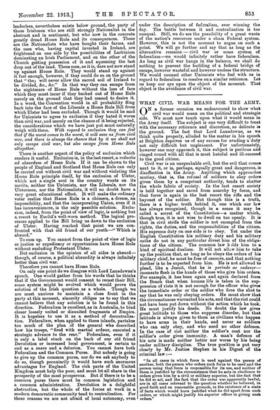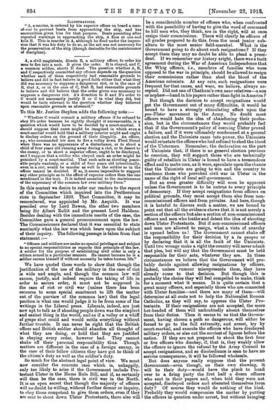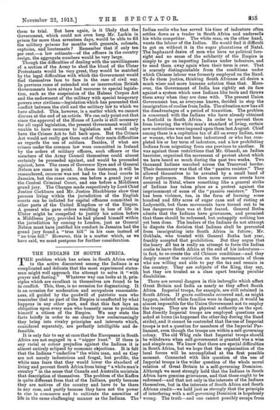WHAT CIVIL WAR MEANS FOR THE ARMY.
ON a former occasion we endeavoured to show what civil war would mean on the political and strategic side. We must now touch upon what it would mean in the Army itself. The subject is one very difficult to treat with the necessary reticence and discretion, so delicate is the ground. The fact that Lord Lansdowne, as we think quite properly, alluded to the matter in his speech at Brighton deprives us of any excuse for evading a duty not only difficult but unpleasant. For unfortunately, however one may approach it, this subject is perilous and ringed round with all that is most hateful and ill-omened to the good citizen.
Civil war is an unspeakable evil, but the evil that comes next to it, or is, perhaps, equally great and dangerous, is disaffection in the Army. Anything which approaches mutiny, that is, the refusal of soldiers to obey orders given them by a competent authority, tends to shatter the whole fabric of society. In the last resort society is held together and saved from anarchy by force, and that force is again in the last resort the rifle and the bayonet of the soldier. But though this is a truth, there is a higher truth behind it, one which our law has always recognized, though in a sense it may be called a secret of the Constitution—a matter which, though true, it is not wise to dwell on too openly. It is that in civil strife the soldier is not exempted from the rights, the duties, and the responsibilities of the citizen. His supreme duty on one side is to obey. Yet under the English Constitution his military duty and his military oaths do not in any particular divest him of the obliga- tions of the citizen. The common law h )lds him to a kind of spiritual dualism. It will not alkw him to take up the position that, as long as he obeys the orders of his military chief, he must be free of censure, and that nothing further is to be expected from him. He is not allowed t.2I plead, like a Jesuit, that he is perinde ac cadaver— insensate flesh in the hands of those who give him orders. For example, it has been again and again declared from the Bench that when human life is taken in the sup- pression of riots it is not enough for the officer who gives the immediate order or the soldier who fires the shot to say that he was only obeying orders. He must show that the circumstances warranted his acts, and that the riot could not have been put down without the action which he took. He must justify his deeds. No doubt the law gives great latitude to those who suppress disorder, but that latitude is always given to them as civilians who happen to have arms in their hands, and never as soldiers who can only obey, and who need no other defence. In the case of riot neither the soldier's coat nor the soldier's order gives immunity. A man's defence of his acts is made neither better nor worse by his being under military discipline. The true position is put very clearly by Mr. Justice Stephen in his Digest of the criminal law :— "In all cases in which force is used against the person of another, both the person who orders such force to be used and the person using that force is responsible for its use, and neither of them is justified by the circumstance that he acts in obedience to orders given him by a civil or military superior, but the fact that he did so act, and the fact that the order was apparently lawful, are in all cases relevant to the question whether he believed, in good faith and on reasonable grounds, in the existence of a state of facts which would have justified what he did apart from such orders, or which might justify his superior officer in giving such orders." ILLUSTRATIONS.
" A, a marine, is ordered by his superior officer on board a man- of-war to prevent boats from approaching the ship, and has ammunition given him for that purpose. Boats persisting after repeated warnings in approaching the ship, A fires at one and kills B. This is murder in A, although he fired under the impres- sion that it was his duty to do sn, as the act was not necessary for the preservation of the ship (though desirable for the maintenance of discipline).
A, a civil magistrate, directs B, a military officer, to order his men to fire into a mob. B gives the order. It is obeyed, and C, a common soldier, shoots D dead. The question whether A, B, and C respectively committed any offence depends on the question whether each of them respectively had reasonable grounds to believe and did in fact believe in good faith either that what they did Was necessary to suppress a dangerous riot, or in the case of B, that A, or in the ease of C, that B, had reasonable grounds to believe and did believe that the order given was necessary to suppress a dangerous riot. A's direction to B and B's order to C would not necessarily justify B or C in what they did, but would be facts relevant to the question whether they believed upon reasonable grounds as aforesaid."
To this Mr. Justice Stephen adds the following note :— " Whether C would commit a military offence if he refused to obey B's order because he rightly thought it unreasonable, is a question which would have to be decided by a court-martial. I should suppose that cases might be imagined in which even a court-martial would hold that a military inferior might and ought to disobey orders on the ground of their illegality. An officer, e.g., who commanded his men to fire a volley down Fleet Street when there was no appearance of a disturbance, or to shoot a child of four years old running away during a riot, or to desert to the enemy, or to shoot a superior officer, ought to be disobeyed, and I suppose that a soldier who obeyed such an order might be punished by a court-martial. That such acts as shooting peace- able people wantonly, or a child of four years old intentionally, even in a riot, would be murder as well in the soldier as in the officer cannot be doubted. If so, it seems impossible to suggest any other principle as to the effect of superior orders than the one mentioned in the text. It is indeed essential to the maintenance of the supremacy of the common law over military force."
In this context we desire to refer our readers to the report of the Committee which inquired into the Featherstone riots in September 1893. That Committee, it may be remembered, was appointed by Mr. Asquith. It was presided over by Lord Bowen, the other two members being Sir Albert Rollit and the present Lord Haldane. Besides dealing with the immediate merits of the case, the Committee gave a general pronouncement upon the law. The Commissioners declared that it was essential to state succinctly what the law was which bears upon the subject of their inquiry. The following passage is taken from that statement :— "Officers and soldiers are under no special privileges and subject to no special responsibilities as regards this principle of the law. A soldier for the purpose of establishing civil order is only a citizen armed in a particular manner. He cannot because he is a soldier excuse himself if without necessity he takes human life."
We have quoted these words to show that though the justification of the use of the military in the case of riot is wide and ample, and though the common law will excuse, justify, and indeed require the taking of life in order to secure order, it must not be supposed in the case of riot or civil war (unless there has been recourse to some special enactment to lift the matter out of the purview of the common law) that the legal position is what one would judge it to be from some of the writings in the Liberal press. Liberals, indeed, are just now apt to talk as if shooting people down was the simplest and easiest thing in the world, and as if a volley or a whiff of grape shot could and would settle everything without further trouble. It can never be right that the British officer and British soldier should abandon all thought of what they are doing, or hold that they are justified in obeying every order, however bad. They cannot shake off their personal responsibility thus : Though matters are different in the case of a foreign enemy, in the case of their fellow citizens they have got to think of the citizen's duty as well as the soldier's duty. So much for the abstract legal point of view. We must now consider the concrete case which is, unhappily, only too likely to arise if the Government include Pro- testant Ulster in the Home Rule Bill, and if, as certainly will then be the case, there is civil war in the North. It is an open secret that though the majority of officers will no doubt be willing, without further demur or inquiry, to obey those competent to give them orders, even if they are sent to shoot down Ulster Protestants, there also will be a considerable number of officers who, when confronted with the possibility of having to give the word of command to kill men who, they think, are in the right, will at once resign their commissions. There will clearly be officers of all grades prepared to do this, from the most junior sub- altern to the most senior field-marshal. What is the Government going to do about such resignations ? If they accept them they may no doubt be able to plead a prece- dent. If we remember our history aright, there was a tacit agreement during the War of American Independence that the Whig officers, i.e., members of families who were opposed to the war in principle, should be allowed to resign their commissions rather than shed the blood of the American colonists. At any rate, such resignations were frequent for that cause, and were, we believe, always ac- cepted. Did not one of Chatham's own near relatives—a son or nephew—hand in his papers rather than fight in America ?
But though the decision to accept resignations would get the Government out of many difficulties, it would be bound to have a strongly stimulating effect upon the pro-Ulster movement in the Army. No doubt most officers would hate the idea of abandoning their profes- sion, but in the circumstances they would probably feel that if the Government's policy of coercing Ulster proved a failure, and if it were ultimately condemned at a general election and the Unionists came into power, the Unionists would reinstate the officers who had refused to shed the blood of the Ulstermen. Remember, the declaration on the part of Unionists that, if there is no general election previous to coercion, they will support those who are technically guilty of rebellion in Ulster is bound to have a tremendous effect and to make men, as it were, speculate upon the chance that the Unionists are going to win and the country to condemn those who provoked civil war in Ulster in the name of the right of local self-government.
But an even greater difficulty will soon be apparent unless the Government is to be untrue to every principle of democracy. If they accept resignations from officers on political grounds, they must accept them also from non- commissioned officers and from privates. And here, though it is hateful to discuss such a matter, we are bound to point out that all the evidence shows that it is not merely a section of the officers but also a section of non-commissioned officers and men who loathe and detest the idea of shooting down Ulster Protestants. But if non-commissioned officers and men are allowed to resign, what a vista of anarchy is opened before us I The Government cannot shake off the responsibility for their decision by a tu guoque or by declaring that it is all the fault of the Unionists. Until two wrongs make a right the country will never admit that plea, but will say that the Government must be held responsible for their acts, whatever they are. In these circumstances we believe that the Government will pro- bably decide against allowing resignations by officers. Indeed, unless rumour misrepresents them, they have already come to that decision. But though this is probably the choice they will feel compelled to make, think for a moment what it means. It is quite certain that a. great many officers, and especially those who are connected with Ulster families—and there are many of them—will determine at all costs not to help the Nationalist Roman Catholics, as they will say, to oppress the Ulster Pro- testants. If their resignations are not accepted, the more hot-headed of them will undoubtedly absent themselves from their duties. Then it seems to us that the Govern- ment, having chosen a path so dangerous, will either be forced to go to the full extremity, and arrest, try by court-martial, and execute the officers who have disobeyed military orders, or else cut the sorriest of figures before the nation. If they are not prepared to shoot the first four or five officers who disobey, if, that is, they weakly allow the officers to ignore the refusal by the Army Council to accept resignations, and so disobedience is seen to have no serious consequences, it will be followed wholesale. But does anyone really suppose that the present Government—even though, on their own showing, it will be their duty—would have the pluck to hand over to a firing party the first half a, dozen officers who sent in their papers and, when told they were not accepted, disobeyed orders and absented themselves from duty ? Of course they would do nothing of the kind. Probably they would compromise the matter by putting the officers in question under arrest, but without bringing them to trial. But here again, is it likely that the Government, which could not even keep Mr. Larkin in prison for more than seventeen days, would be able to fill the military prisons for months with generals, colonels, captains, and lieutenants ? Remember that if only ten per cent.—a low estimate—of the officers in the country resign, the aggregate numbers would be very large. Though the difficulties of dealing with the unwillingness of a section of the Army to shed the blood of the Ulster Protestants would be very great, they would be matched by the legal difficulties with which the Government would find themselves face to face in the case of civil war. In previous cases of extended riot or insurrection British Governments have always had recourse to special legisla- tion, such as the suspension of the Habeas Corpus Act and the endowment of the military with special temporary powers over civilians—legislation which has prevented that conflict between the civil and the military law to which we have alluded. This, however, is a matter which we cannot discuss at the end of an article. We can only point out that since the approval of the House of Lords is still necessary for all rapid legislation, the present Government would be unable to have recourse to legislation and would only have the Crimes Act to fall back upon. But the Crimes Act would not really get them out of their main difficulties as regards the use of soldiers. Besides, if what are crimes under the common law were committed in Ireland by the orders of military officers, such officers or the members of the Army Council themselves could almost certainly be proceeded against, and would be proceeded against, here. The cases of Governor Eyre and of General Nelson are cases in point. In those instances, it will be remembered, recourse was not had to the local courts in Jamaica, but the cases came, one before a grand jury at the Central Criminal Court, and one before a Middlesex grand jury. The Charges made respectively by Lord Chief Justice Cockburn and Mr. Justice Blackburne show that persons living within the jurisdiction of the English courts can be indicted for capital offences committed in other parts of the United Kingdom or of the Empire. A general who gave orders resulting in loss of life in Ulster might be compelled to justify his action before a Middlesex jury, provided he had placed himself within the jurisdiction by coming to London, just as General Nelson must have justified his conduct in Jamaica had the grand jury found a "true bill" in his case instead of "no true bill." However, this is a matter which, as we have said, we must postpone for further consideration.




















































 Previous page
Previous page